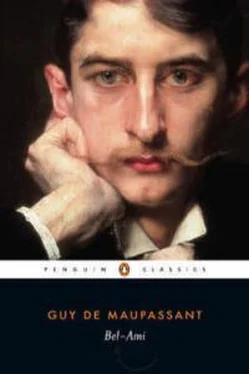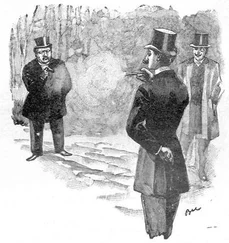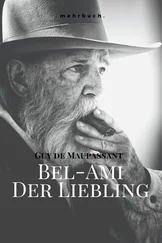Duroy laughed: "Egad, you make me shudder."
Norbert de Varenne continued: "You do not understand me now, but later on you will remember what I have told you. We breathe, sleep, drink, eat, work, and then die! The end of life is death. What do you long for? Love? A few kisses and you will be powerless. Money? What for? To gratify your desires. Glory? What comes after it all? Death! Death alone is certain."
He stopped, took Duroy by his coat collar and said slowly: "Ponder upon all that, young man; think it over for days, months, and years, and you will see life from a different standpoint. I am a lonely, old man. I have neither father, mother, brother, sister, wife, children, nor God. I have only poetry. Marry, my friend; you do not know what it is to live alone at my age. It is so lonesome. I seem to have no one upon earth. When one is old it is a comfort to have children."
When they reached Rue de Bourgogne, the poet halted before a high house, rang the bell, pressed Duroy's hand and said: "Forget what I have said to you, young man, and live according to your age. Adieu!" With those words he disappeared in the dark corridor.
Duroy felt somewhat depressed on leaving Varenne, but on his way a perfumed damsel passed by him and recalled to his mind his reconciliation with Mme. de Marelle. How delightful was the realization of one's hopes!
The next morning he arrived at his lady–love's door somewhat early; she welcomed him as if there had been no rupture, and said as she kissed him:
"You do not know how annoyed I am, my beloved; I anticipated a delightful honeymoon and now my husband has come home for six weeks. But I could not let so long a time go by without seeing you, especially after our little disagreement, and this is how I have arranged matters: Come to dinner Monday. I will introduce you to M. de Marelle, I have already spoken of you to him."
Duroy hesitated in perplexity; he feared he might betray something by a word, a glance. He stammered:
"No, I would rather not meet your husband."
"Why not? How absurd! Such things happen every day. I did not think you so foolish."
"Very well, I will come to dinner Monday."
"To make it more pleasant, I will have the Forestiers, though I do not like to receive company at home."
On Monday as he ascended Mme. de Marelle's staircase, he felt strangely troubled; not that he disliked to take her husband's hand, drink his wine, and eat his bread, but he dreaded something, he knew not what. He was ushered into the salon and he waited as usual. Then the door opened, and a tall man with a white beard, grave and precise, advanced toward him and said courteously:
"My wife has often spoken of you, sir; I am charmed to make your acquaintance."
Duroy tried to appear cordial and shook his host's proffered hand with exaggerated energy. M. de Marelle put a log upon the fire and asked:
"Have you been engaged in journalism a long time?"
Duroy replied: "Only a few months." His embarrassment wearing off, he began to consider the situation very amusing. He gazed at M. de Marelle, serious and dignified, and felt a desire to laugh aloud. At that moment Mme. de Marelle entered and approached Duroy, who in the presence of her husband dared not kiss her hand. Laurine entered next, and offered her brow to Georges. Her mother said to her:
"You do not call M. Duroy Bel–Ami to–day."
The child blushed as if it were a gross indiscretion to reveal her secret.
When the Forestiers arrived, Duroy was startled at Charles's appearance. He had grown thinner and paler in a week and coughed incessantly; he said they would leave for Cannes on the following Thursday at the doctor's orders. They did not stay late; after they had left, Duroy said, with a shake of his head:
"He will not live long."
Mme. de Marelle replied calmly: "No, he is doomed! He was a lucky man to obtain such a wife."
Duroy asked: "Does she help him very much?"
"She does all the work; she is well posted on every subject, and she always gains her point, as she wants it, and when she wants it! Oh, she is as maneuvering as anyone! She is a treasure to a man who wishes to succeed."
Georges replied: "She will marry very soon again, I have no doubt."
"Yes! I should not even be surprised if she had some one in view—a deputy! but I do not know anything about it."
M. de Marelle said impatiently: "You infer so many things that I do not like! We should never interfere in the affairs of others. Everyone should make that a rule."
Duroy took his leave with a heavy heart. The next day he called on the Forestiers, and found them in the midst of packing. Charles lay upon a sofa and repeated: "I should have gone a month ago." Then he proceeded to give Duroy innumerable orders, although everything had been arranged with M. Walter. When Georges left him, he pressed his comrade's hand and said:
"Well, old fellow, we shall soon meet again."
Mme. Forestier accompanied him to the door and he reminded her of their compact. "We are friends and allies, are we not? If you should require my services in any way, do not hesitate to call upon me. Send me a dispatch or a letter and I will obey."
She murmured: "Thank you, I shall not forget."
As Duroy descended the staircase, he met M. de Vaudrec ascending. The Count seemed sad—perhaps at the approaching departure.
The journalist bowed, the Count returned his salutation courteously but somewhat haughtily.
On Thursday evening the Forestiers left town.
Chapter VII.
A Duel With an End
Charles's absence gave Duroy a more important position on "La Vie Francaise." Only one matter arose to annoy him, otherwise his sky was cloudless.
An insignificant paper, "La Plume," attacked him constantly, or rather attacked the editor of the "Echoes" of "La Vie Francaise."
Jacques Rival said to him one day: "You are very forbearing."
"What should I do? It is no direct attack."
But, one afternoon when he entered the office, Boisrenard handed him a number of "La Plume."
"See, here is another unpleasant remark for you."
"Relative to what?"
"To the arrest of one Dame Aubert."
Georges took the paper and read a scathing personal denunciation. Duroy, it seems, had written an item claiming that Dame Aubert who, as the editor of "La Plume," claimed, had been put under arrest, was a myth. The latter retaliated by accusing Duroy of receiving bribes and of suppressing matter that should be published.
As Saint–Potin entered, Duroy asked him: "Have you seen the paragraph in 'La Plume'?"
"Yes, and I have just come from Dame Aubert's; she is no myth, but she has not been arrested; that report has no foundation."
Duroy went at once to M. Walter's office. After hearing the case, the manager bade him go to the woman's house himself, find out the details, and reply, to the article.
Duroy set out upon his errand and on his return to the office, wrote the following:
"An anonymous writer in 'La Plume' is trying to pick a quarrel with me on the subject of an old woman who, he claims, was arrested for disorderly conduct, which I deny. I have myself seen Dame Aubert, who is sixty years old at least; she told me the particulars of her dispute with a butcher as to the weight of some cutlets, which dispute necessitated an explanation before a magistrate. That is the whole truth in a nutshell. As for the other insinuations I scorn them. One never should reply to such things, moreover, when they are written under a mask. GEORGES DUROY."
M. Walter and Jacques Rival considered that sufficient, and it was decided that it should be published in that day's issue.
Duroy returned home rather agitated and uneasy. What would this opponent reply? Who was he? Why that attack? He passed a restless night. When he re–read his article in the paper the next morning, he thought it more aggressive in print than it was in writing. He might, it seemed to him, have softened certain terms. He was excited all day and feverish during–the night. He rose early to obtain an issue of "La Plume" which should contain the reply to his note. He ran his eyes over the columns and at first saw nothing. He was beginning to breathe more freely when these words met his eye:
Читать дальше











